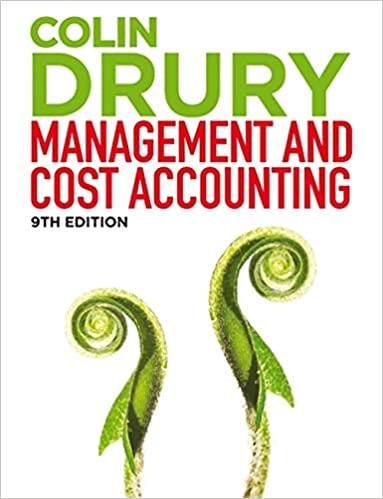Question
The following is the description of sales and cash receipts for the Ladys Fashion Fair, a retail store dealing in expensive womens clothing. Sales are
The following is the description of sales and cash receipts for the Ladys Fashion Fair, a retail store dealing in expensive womens clothing. Sales are for cash or credit, using the stores own billing rather than credit cards. Each salesclerk has her own sales book with prenumbered, three-copy, multicolored sales slips attached, but perforated. Only a central cash register is used. It is operated by the store supervisor, who has been employed for 10 years by Alice Olson, the store owner. The cash register is at the store entrance to control theft of clothes. Salesclerks prepare the sales invoices in triplicate. The original and the second copy are given to the cashier. The third copy is retained by the salesclerk in the sales book. When the sale is for cash, the customer pays the salesclerk, who marks all three copies paid and presents the money to the cashier with the invoice copies. All clothing is put into boxes or packages by the supervisor after comparing the clothing to the description on the invoice and the price on the sales tag. She also rechecks the clerks calculations. Any corrections are approved by the salesclerk. The clerk changes her sales book at that time. A credit sale is approved by the supervisor from an approved credit list after the salesclerk prepares the three-part invoice. Next, the supervisor enters the sale in her cash register as a credit or cash sale. The second copy of the invoice, which has been validated by the cash register, is given to the customer. At the end of the day, the supervisor recaps the sales and cash and compares the totals to the cash register tape. The supervisor deposits the cash at the end of each day in the banks deposit box. The cashiers copies of the invoices are sent to the accounts receivable clerk along with a summary of the days receipts. The bank mails the deposit slip directly to the accounts receivable clerk. Each clerk summarizes her sales each day on a daily summary form, which is used in part to calculate employees sales commissions. Marge, the accountant, who is prohibited from handling cash, receives the supervisors summary and the clerks daily summary form. Daily, she puts all sales invoice information into the firms computer, which provides a complete printout of all input and summaries. The accounting summary includes sales by salesclerk, cash sales, credit sales, and total sales. Marge compares this output with the supervisors and salesclerks summaries and reconciles all differences. The computer updates accounts receivable, inventory, and general ledger master files. After the update procedure has been run on the computer, Marges assistant files all sales invoices by customer number. A list of the invoice numbers in numerical sequence is included in the sales printout. The mail is opened each morning by a secretary in the owners office. All correspondence and complaints are given to the owner. The secretary prepares a prelist of cash receipts. He totals the list, prepares a deposit slip, and deposits the cash daily. A copy of the prelist, the deposit slip, and all remittances returned with the cash receipts are given to Marge. She uses this list and the remittances to record cash receipts and update accounts receivable, again by computer. She reconciles the total receipts on the prelist to the deposit slip and to her printout. At the same time, she compares the deposit slip received from the bank for cash sales to the cash receipts journal. A weekly aged trial balance of accounts receivable is automatically generated by the computer. A separate listing of all unpaid bills over 60 days is also automatically prepared. These are given to Mrs. Olson, who acts as her own credit collector. She also approves all write-offs of uncollectible items and forwards the list to Marge, who writes them off. Each month Marge mails statements generated by the computer to customers. Complaints and disagreements from customers are directed to Mrs. Olson, who resolves them and informs Marge in writing of any write-downs or misstatements that require correction. The computer system also automatically totals the journals and posts the totals to the general ledger. A general ledger trial balance is printed out, from which Marge prepares financial statements. Marge also prepares a monthly bank reconciliation and reconciles the general ledger to the aged accounts receivable trial balance. Because of the importance of inventory control, Marge prints out the inventory perpetual totals monthly, on the last day of each month. Salesclerks count all inventory after store hours on the last day of each month for comparison with the perpetuals. An inventory shortages report is provided to Mrs. Olson. The perpetuals are adjusted by Marge after Mrs. Olson has approved the adjustments.
. 4. For each cash receipts transaction-related audit objective, identify one or more existing controls.
5. Identify deficiencies in internal control for sales and cash receipts.
6. Prepare a control risk Matrix, then, assess the control risk related to the cycle.
(please without hand writing photo)
Step by Step Solution
There are 3 Steps involved in it
Step: 1

Get Instant Access to Expert-Tailored Solutions
See step-by-step solutions with expert insights and AI powered tools for academic success
Step: 2

Step: 3

Ace Your Homework with AI
Get the answers you need in no time with our AI-driven, step-by-step assistance
Get Started


